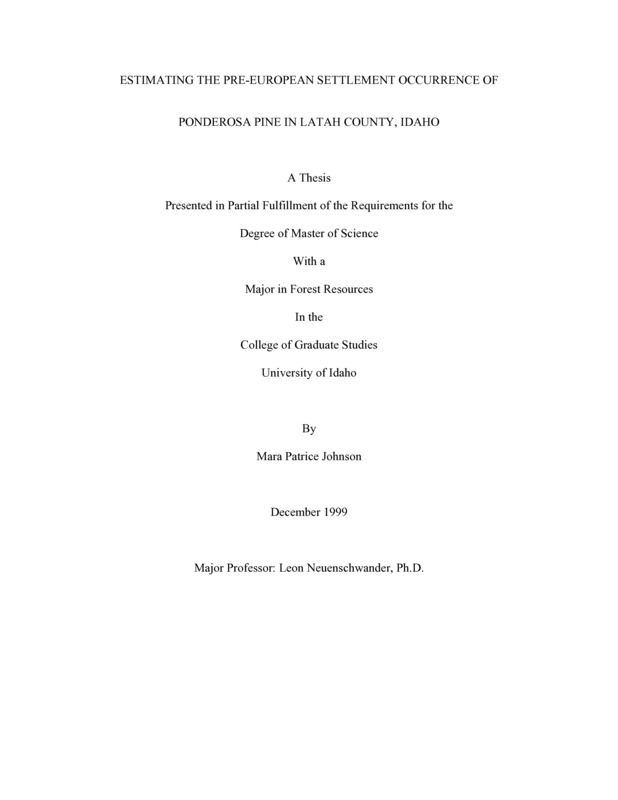PDF PREVIEW
Estimating the Pre-European Settlement Occurrence of Ponderosa Pine in Latah County, Idaho Item Info
- Title:
- Estimating the Pre-European Settlement Occurrence of Ponderosa Pine in Latah County, Idaho
- Creator:
- Johnson, Mara Patrice
- Date Created:
- 1999-12
- Description:
- Over the past century, ponderosa pine (Pinus ponderosa) forests have declined in distribution throughout their range and now occur primarily in dense stands with smaller trees (Covington and Moore 1994). Some researchers believe the window of opportunity for rectifying these unhealthy conditions through ecological restoration is fairly small, perhaps 15 to30 years (Covington et al. 1994). Noss et al. (1995) considers pre-European settlement conditions as a reasonable goal for restoration because this predates extensive manipulation and degradation of many forests in the West. The primary objective of this study was to quantify and map historic occurrence of ponderosa pine for Latah County in northern Idaho by correlating occurrence of ponderosa pine in the original General Land Office (GLO) survey records to biophysical variables. A regression model was used to estimate pre-settlement ponderosa pine distribution. The secondary objective was to compare the estimated pre-settlement ponderosa pine to the current distribution and show any changes. The model used in this study estimates pre-settlement ponderosa pine forests occurred over 887,362,200 m2 of Latah County. The current land cover classification shows 101,074,500m2 of ponderosa pine forests now exists, a loss of 89 percent. This study suggests the largest amount of pre-settlement ponderosa pine forests has been replaced by agriculture. Agricultural lands have replaced about 426,569,400 m2 of ponderosas pine forests in the study area. In addition, 61,515,900 m2 of estimated pre-settlement mixed xeric forest is now agricultural land. Next to agriculture, pre-settlement ponderosa pine forests have been predominantly replaced by foothills grassland (197,369,100 m2 ), warm mesic shrubland (75,053,700 m2 ), mixed xeric forest (30,573,000 m2 ), mixed mesic forest (24,843,600 m2 ), and Douglas-fir forests (17,659,800 m2 ). This study shows using geographical information systems (GIS) allows large areas to effectively be assessed fairly rapidly. It also shows that using GLO original survey records to estimate pre-European settlement in the West may provide some of the best information on relatively unimpacted forests. The GLO original survey records were especially useful in this study because they were most complete and systematic records of pre-European settlement forests for the area.
- Document Type:
- Thesis
- Library Call Number:
- QK494.5.P66J63 1999
- Subjects:
- Latah County ponderosa pine pinus ponderosa pre-European settlement historic occurrence site conditions silviculture
- Location:
- Latah County
- Department:
- Department of Forest Resources
- Type:
- Text
- Format:
- application/pdf
Source
- Preferred Citation:
- "Estimating the Pre-European Settlement Occurrence of Ponderosa Pine in Latah County, Idaho", UIEF Research Exchange, University of Idaho Library Digital Collections, https://www.lib.uidaho.edu/digital/uief/items/uief_0043.html
Rights
- Rights:
- In copyright, educational use permitted.
- Standardized Rights:
- http://rightsstatements.org/vocab/InC-EDU/1.0/

